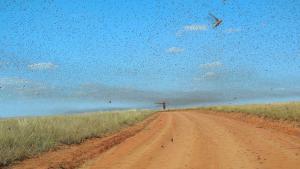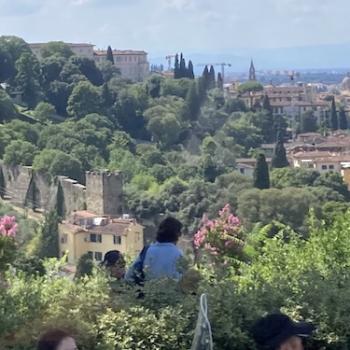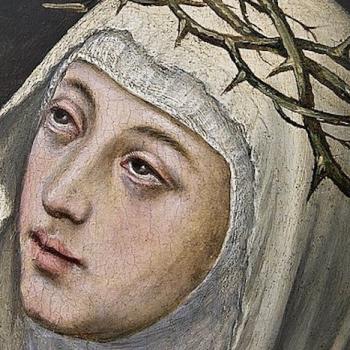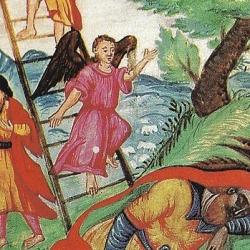
[[File:Swarm of Locusts.JPG|Swarm_of_Locusts]]
Today I have war on my mind. A week ago, a surprise attack on Jewish communities in the Gaza Strip ignited a war in the middle east on a scale I haven’t know in my lifetime. We are 18 months into a war in Ukraine that began with an invasion and ground troops such as hasn’t been seen in Europe since the second world war.
The prophet Joel writes with war on his mind. We know next to nothing about this seer of ancient Israel. He doesn’t begin with “in the year of King Someone,” or even “the word came to Joel, a shepherd from the town of Somewhere.” He just sets out into a lament. About locust and invading armies.
What the locust has eaten
In fact, we don’t even know if he’s talking about locust as a metaphor for armies of humans, or armies of humans as a metaphor for locust. To be honest, it sounds to me like he’s talking about locust.
What the cutting locust left,
the swarming locust has eaten.
What the swarming locust left,
the hopping locust has eaten,
and what the hopping locust left,
the destroying locust has eaten. (Joel 1:4)
I think he’s talking about locust.
Locust are grasshoppers, so flooded with serotonin that dormant potential switches on in the genotype. They armor up, lose their instinct for solitude, and become pixels of a swarming cloud that devours everything it can. Joel says it’s like living in a walled village when an army attacks. It all comes so quickly and in such numbers that they have scaled our walls and burned our homes before we even know they’re upon us.
Sin and repentance in the year of the locust
But the prophet suggests a very strange way of responding to this decimation. Repent. Put on sackcloth and sit in ashes. Sanctify a fast.
Repent? When the armies are attacking us? Fast? When our food supply has been utterly wiped out so that we’re searching for crumbs for the children? What is Joel telling us?
In order to understand what he means by repentance, we need to bring into view his very unique doctrine of sin. Hamartiology, in the technical vocabulary of systematic theology.
We’re accustomed to the prophets telling us about coming calamities or calamities that have, to quote a cheerleading movie from my sisters’ teenage years, “already been broughten.”
And we’re used to these prophets telling us why such things have fallen on Israel and Judah. It’s because of idolatry, unjust economic practices, turning from Torah and toward the gods of other nations. These are the sins that bring the Lord thundering in through the armies of Assyria or Babylon.
There are hints of that in Joel, but it’s nowhere near the theme of his address.
The economy of grace
Instead, at the heart of his lament are missing grain offerings. Damaged prayers. That is the sin: the morning after the locust have devoured their fields, the people cannot pray.
See, Joel assumes what I’ll call a circular economy of grace. God gives land and river and rain, and the land and river and rain give themselves to plant growth and the flourishing of animals. The plants and animals give themselves to one another, and among those animals are humans, we who hunt, gather, domesticate cattle, and farm vineyards and fields of grain. Israel then takes those gifts and brings them to back to God—the God whose gift-giving initiated all of this and keeps it running. With hands full of grain, they come and return thanks to YHWH.
But now all of that is disrupted. See what the locust have wrought?
The grain offering and the drink offering are cut off
from the house of the LORD.
The priests mourn,
the ministers of the LORD.
The fields are devastated,
the ground mourns;
for the grain is destroyed,
the wine dries up,
the oil fails.
Be dismayed, you farmers,
wail, you vinedressers,
over the wheat and the barley;
for the crops of the field are ruined.
The vine withers,
the fig tree droops.
Pomegranate, palm, and apple—
all the trees of the field are dried up;
surely, joy withers away
among the people. (1:9-12)
The circular economy of grace is broken. No one—not the plants or animals even—can find their place in it. Joy itself has withered like a stripped vine.
How the animals groan!
The herds of cattle wander about
because there is no pasture for them;
even the flocks of sheep are dazed.
Even the wild animals cry to you
because the watercourses are dried up,
and fire has devoured
the pastures of the wilderness. (1:18-20)
The sin of the year of the locust is that no one—not the ground, the wilderness, the plants, the animals, the humans— can give gifts to or receive gifts from God and one another. We come before God with nothing to give.
And here is what the prophet prescribes: pray holding nothing in your hands but ash and empty stalks. Make the emptiness of your bellies into a sanctified fast. Repentance is not for this prophet a matter of confessing sorrow for things done and left undone. It is how you pray when you are cut off from the circulation of grace and come before God empty.
Maybe that is what sin most centrally is. It can be and often is about things done and left undone, but that’s secondary: a connotation rather than a denotation, in philosophical vocabulary. Sin at its heart is what we call the powers within creation that pull us out of the economy of gift-exchange. The powers that overwhelm like locust, so that instead of greeting a friend with a loaf of bread, I cower before an army who scales the walls and devours anything that might have become a gift.
War and repentance
Last night in Gaza, as Sabbath began, thousands of Jews huddled together, wondering when the next swarm of terror will overtake them and their families. Who can keep Sabbath, keep faith, at time like this? Their Palestinian neighbors, living in prison cities, were too busy wondering where to flee from the Israeli air raids to listen to the prayer calls yesterday, or, for the Palestinian Christians, to celebrate the resurrection tomorrow.
In Ukraine next month, Orthodox Christian refugees will be too occupied with standing in bread lines to observe the beginning of the Nativity fast. Russian families will spend the season mourning the flood of serotonin that turned their children into a swarming army.
This is sin: forces of creation—decreation, really—that have pulled these created beings out of the grace economy. When you pray for Gaza, pray as though standing next to them with empty hands. And when it’s our time to endure devastating loss, let’s look for people around us who can call us to repent. To repent in this very Joeline way: let your emptiness become your prayer.
The years that the locust has eaten
Finally: lest we think God will leave us devastated while the locust have the last word, Joel gives us that remarkable promise: the Lord “will restore the years that the locust has eaten” (2:25).
This is not an optimism about next year’s harvest, about the sun coming out tomorrow. This is an eschatological hope: a refusal to let the swarming gracelessness devour our faith. Repentance, finally, is an eschatological act: I stand outside of the economy of grace, hands empty of the gifts I want to bring, and I offer to you, God, the eaten years that only you can give me back.
This is my prayer for those suffering from war today, and it is my prayer for all creatures everywhere who find themselves isolated from the circulation of grace. “O Lord, restore to us the years that the locust have eaten.”
Amen.
I preached this sermon in Seminary of the Southwest’s Christ Chapel, 10-13-2023.









